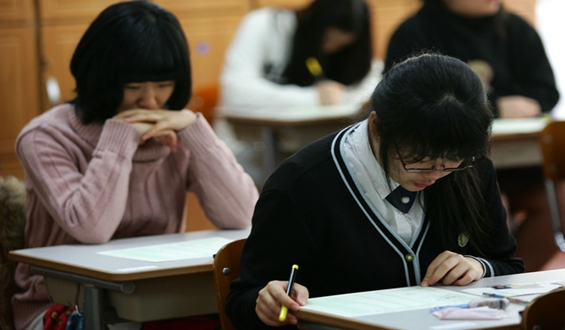by JAMES S. KIM
Thousands of Chinese and South Korean students who took their SATs earlier this month will have to wait a bit longer for their scores to arrive. The Educational Testing Service (ETS), which administers the exam around the world, is temporarily withholding scores in response to allegations of cheating, according to the New York Times.
The Educational Testing Service, which is contracted by the College Board to administer the test overseas, said in a statement that they had “specific, reliable information” that there were “organizations that seek to illegally obtain test materials for their own profit, to the ultimate detriment of all students.” The ETS also said it would investigate and release valid scores by mid-November.
The SAT is a crucial test for international students applying for American colleges and universities. Unfortunately for the students affected in this latest cheating scandal, they won’t be able to send their scores in time to make the early decision deadline, which is at the end of October for most institutions.
An executive director at Princeton Review’s Hong Kong and Shanghai divisions told TIME that most of the students who are applying for early decision to American universities already have scores from past tests, but most likely took the October exam in hopes of submitting a higher score.
Students took to social media and message boards, understandably expressing concerns over whether or not their chances of admission would be affected. ETS spokesman Thomas Ewing assuaged these fears, telling TIME this past Wednesday that ETS would “make universities aware of the circumstances and supply students with a letter to share with the schools to which they are applying.” Other admissions counselors also commented that the delay would not hurt chances of admissions — as long as they weren’t implicated in the investigation.
The news isn’t all too surprising, especially regarding the highly competitive South Korean education system. In the past, a number of preparation schools have been accused of acquiring test questions in advance and then sharing them with their clientele — the students. The SAT was cancelled in South Korea in May of last year, and 900 scores were voided in 2007 due to the same reports.
The picture gets worse in the case of the yearly college entrance exam, which is considered a “make-or-break” moment for young Koreans. The South Korean Ministry of Education faces a difficult task of fixing a system that has been described as an “arms race.” Parents reportedly paid $18 billion in 2013 for private education in cram schools, also known as hagwons, to gain an advantage in the yearly college entrance exam. An average household of two children spends more than 4 million won ($3,946), or about 10 percent of monthly income, on private education.
Most of the money goes to private English lessons, which explains the bottomless need for English teachers. In August, Education Minister Hwang Woo-yea said the ministry was considering changing the grading system for English, one of the most competitive subjects in the entrance exam. According to previous test-takers, a single wrong answer in English could mean a student missing the cut for the highest tier of scoring to be considered for an elite university.
All that spending and stressing apparently isn’t paying off too handsomely. Learning company EF Education First ranked South Korea at No. 24 among 60 countries in English proficiency.
Lying on college applications is a rampant issue as well, according to Joongang Daily. Students include awards that don’t exist, volunteer and extracurricular activities they’ve never done and awards they’ve never received. In many instances, their teachers have no problem writing recommendation letters full of activities and achievements the student never fulfilled. A system that was meant to help rural and lower income students by taking the focus off standardized test scores doesn’t have the capacity and regulations to properly screen applicants.
Since 2011, South Korea has led the world in the percent of young adults with a college education, according to the Organization for Economic Cooperation and Development (OECD). But as always, the numbers don’t tell the whole story — after all, an incredibly competitive system that drives many to cheat, lie and spend huge amounts of money can’t be healthy for the students.
A poll by the Korea Health Promotion Foundation taken earlier this year revealed that over half of the teens polled said they had suicidal thoughts this year, and one in three said they felt very depressed. In addition, almost half of the teens polled said school pressure and uncertainty of the future were the main causes of stress. This is evident in Korean Students Speak, a Tumblr project created by a group of Fulbright English Teaching Assistants who wanted to allow their students to creatively express their opinions about anything. Many students took the opportunity to vent and express their frustrations about the pressure of school.
Test scores and intensive education may have made sense during the “age of industrialization,” said Lee Ju-ho, an academic at a think tank in Seoul and former education minister. But not anymore.
“We look into the ways to reform our education system not based on test scores, but based on creativity and social and emotional capacities,” Lee told BBC News last year.
Education Minister Seo Nam-Soo echoed the same sentiment, which is at least a start. “We still have a long way to go,” he said, “but we are doing some soul-searching in our society, and our goals now are about how to make our people happier.”
Image via Education News







